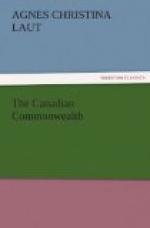Knowing the Viking spirit that rode out to conquer the very elements in the teeth of death, it is easy to look back and realize that these Angles and Jutes and Saxons were bound to found a great sea empire. So, too, of the New England Puritans! Men who sacrificed their all for a political and religious belief were bound to build of such belief foundation for a sturdy nation of the future. It is easy to look back and realize. It is hard to look forward with eyes that see; but one must be a very opaque thinker, indeed, not to wonder what this latest vast migration of Saxon blood portends for future empire. The Jutes and Angles and Saxons poured into ancient Albion for just one reason—to acquire each for his own freehold of land. Look at the ancient words! Freehold of land! For what else have a million and a half British born come to the free homesteads of Canada? For freehold of land—land unoppressed by taxes for war lords; land unoppressed by tithes for landlord; land absolutely free to the worker. That such a migration should break in waves over Canadian life and leave it untouched, uninfluenced, unswerved, is as inconceivable as that the Jutes and Angles and Saxons could have settled in ancient Albion and not made it their own.
II
For years Canada was regarded chiefly in England as a dumping ground for slums. “You have broken your mother’s heart,” thundered an English magistrate to a young culprit. “You have sent your father in sorrow to the grave. Why—I ask you—do you not go to Canada?” That such material did not offer the best fiber for the making of a nation in Canada did not dawn on this insular magisterial dignitary; and the sentiments uttered were reflected in the activities of countless philanthropies that seemed to think the porcine could be transmogrified into the human by a simple transfer from the pig-sty of their own vices and failure to the free untrammeled life of a colony. Fortunately Canada has a climate that kills men who won’t work. Men must stand on their own feet in Canada, and keep those feet hustling in winter—or die. It is not a land for people who think; the world owes them a living. They have to earn the living and earn it hard, and if they don’t earn it, there are neither free soup kitchens nor maudlin charities to fill idle stomachs with some other man’s earnings.
“Why do you think so many young Englishmen fail to make good in Canada?” I asked a young Yorkshire mill hand who had come to Canada with his five brothers and homesteaded nearly a thousand acres on the north bank of the Saskatchewan. The house was built of logs and clay. There was not a piece of store furniture in it except the stove. The beds were berths extemporized ship-fashion, with cowhides and bear-skins for covering. The seats were benches. The table was a rough-hewn plank. These young factory hands had things reduced to the simplicity




